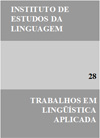Abstract
The authors assume that the development of a critical awareness of the world ought to be the main objective of all education, including language education. Language awareness programmes ought therefore to help children develop not only operational and descriptive knowledge of the linguistic practices of their world, but also a critical awareness of how these practices are shaped by, and shape, social relationships and relationships of power. In the first part of a two-part paper, the authors show that many existing language awareness proposals and materials are not ‘critical’ in this sense. On the contrary, with a few exceptions, they present the naturalised domain of linguistic practices as a natural domain, a given and common sense reality with social origins which are out of sight. This is true for bilingual, dialectal and diatypic variation. Most current approaches to language awareness present the domain of linguistic practices as a pluralistically harmonious domain; no attention is given to ideological differences or ideological struggles in language, and, in fact, the nexus of language-power-ideology is ignored. Despite their admirable attempts to heighten cross-cultural undertanding and harmony, they appear to underscore the legitimacy of the already legitimated set of existing linguistic practices, and therefore indirectly of the existing power relations which underpin these practices. In the second part of the paper, they briefly explore the notion of Critical Language Analysis (or Critical Linguistics in a generic sense), and indicate how this approach might contribute to more critical Language Awareness programmes. The authors also argue that the diverse objectives which are usually given for Language Awareness programmes appear to be given particular desocialising weightings in actual materials, and suggest a way of articulating the various objectives that might be in agreement with a critical perspective. They end with an example of how Critical Language Awareness can be incorporated into a family history writing project.
Trabalhos em Linguística Aplicada uses a Creative Commons (CC-BY) license, thus preserving the integrity of the articles in an open access environment. Journal authors retain the copyright of their work by licensing it under the Creative Commons Attribution license, which allows articles to be reused and distributed without restriction, as long as the original work is correctly cited.
Intellectual Property and Terms of Use
All content published in Trabalhos em Linguística Aplicada, unless otherwise specified, is under the Creative Commons Attribution License (CC-BY). This allows the material to be shared and adapted without restriction, as long as due credit is given and any changes made are indicated.
The authors retain the copyright to their work and take full responsibility for its content in the event of any challenge by third parties. The opinions expressed by the authors of the articles are their sole responsibility.
TLA reserves the right to make normative changes to the originals, such as changes to spelling and grammar to comply with the cultured norm of the language, as well as adjustments to form related to the editorial standard of the journal.

